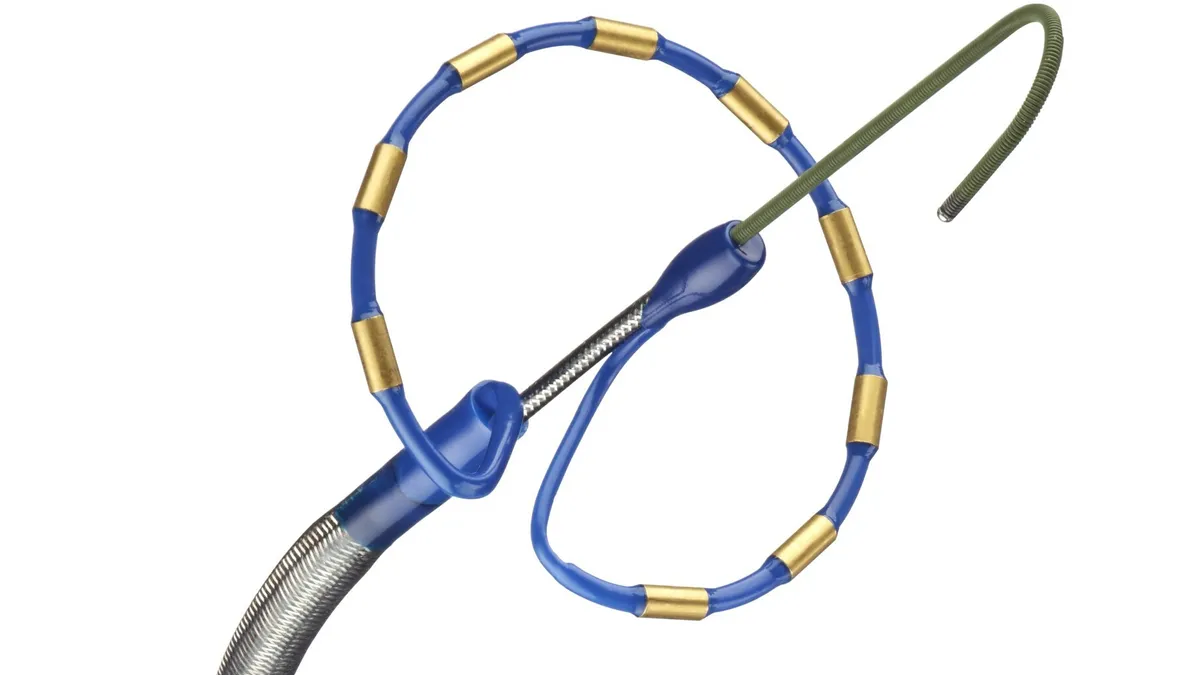Dive Brief:
- Medtronic’s PulseSelect pulsed field ablation system exceeded safety and efficacy goals in a single-arm study of the device, according to results presented Monday at the American College of Cardiology Scientific Sessions in New Orleans.
- Pulsed-field ablation (PFA) is a minimally invasive procedure that uses a catheter to deliver electrical pulses to scar heart tissue, preventing atrial fibrillation, and is safer than current methods, but at least equally effective.
- Johnson & Johnson and Boston Scientific have also shared study results of competing devices. While the studies are not entirely comparable, an emerging market for the procedure will likely be competitive.
Dive Insight:
With clinical trial readouts and new PFA product launches slated for 2023 and 2024, the $8 billion electrophysiology market “is at a notable turning point,” JP Morgan analyst Robbie Marcus wrote in a February note to investors.
Because PFA is more selective than other ablation methods, reducing the risk of damage to surrounding tissue, and is also significantly faster, taking 30 minutes or less, compared to the 1.5 to 2 hours needed for radiofrequency ablation, “we think PFA will eventually become the primary modality for paroxysmal atrial fibrillation ablation,” Marcus added.
BTIG Analyst Marie Thibault wrote in a research note on Monday that while differences in monitoring protocol and efficacy endpoints “muddy the comparison between these earliest PFA technologies, we do think PulseSelect can secure FDA approval.”
The 300-person trial of Medtronic’s PulseSelect device, published in Circulation, found that 66% of patients with paroxysmal atrial fibrillation and 55% of patients with persistent atrial fibrillation were free from acute procedural failure, arrhythmia recurrence, or anti-arrhythmic escalation after one year. Only two safety events, a cardiac perforation and a cerebrovascular accident, were reported.
The study was funded by Medtronic, and had no control group.
The efficacy results were above the performance goals for the study of 50% and 40% respectively, but below the early results for J&J subsidiary Biosense Webster’s inspIRE trial, where 12-month primary efficacy was achieved in 70.9% of patients with paroxysmal atrial fibrillation, Thibault wrote. Differing metrics between the studies make them difficult to compare.
“While we see this as no doubt a positive development for PFA, we remain more bullish on Affera and Boston Scientific’s Farapulse, both built with PFA in mind, giving them a slight edge in terms of efficacy and usability in our view,” Marcus wrote in a research note on Monday.
Medtronic acquired Affera, which also makes cardiac ablation and cardiac mapping devices, in August for $935 million. The subsidiary is expected to share results of its own PFA system later, possibly in the first half of 2024.
Meanwhile, Boston Scientific subsidiary Farapulse has an approved PFA treatment in Europe, and is expected to share results of its ADVENT trial in the second half of this year. Currently, Medtronic’s PulseSelect catheter is expected to be the first to enter the US market, Marcus wrote.












